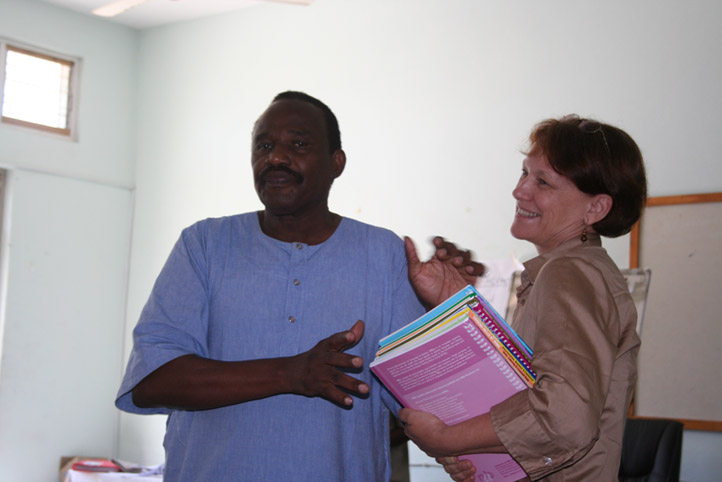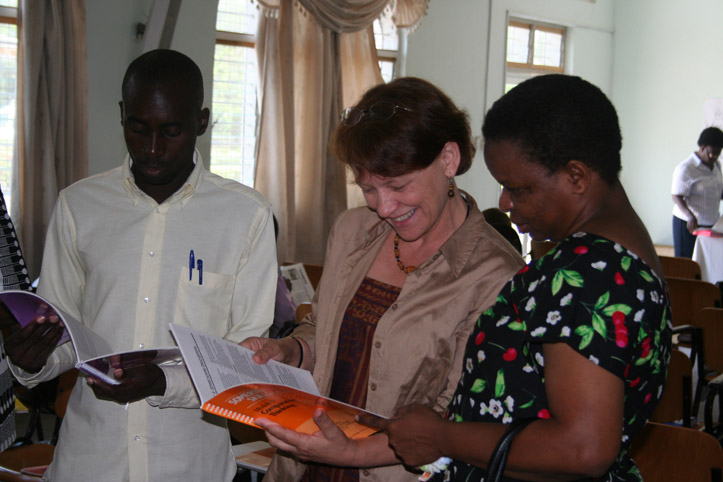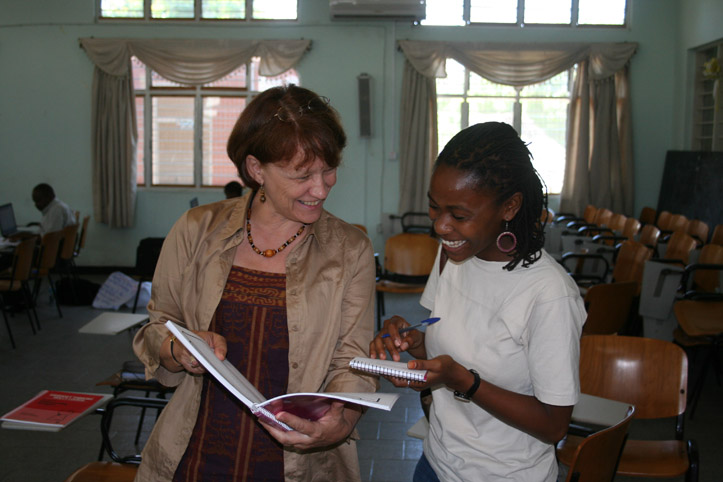Somerset Thinking Skills Course goes to Africa
After a lifetime (each) spent in education, David and Jan Townend moved to Tanzania in September 2008, to spend the early years of retirement as education volunteers. Invited by the Ministry of Education and Vocational Training to help ‘shift the paradigm’ from teacher-centred, chalk and talk education, to student-centred, participatory classrooms, they were asked to come under the umbrella of VSO. They – and VSO – readily agreed.
The Ministry posted them to Morogoro Teachers’ College, a leading college which trains about 1200 secondary school teachers on a two-year Diploma programme.
David is a chemistry teacher, with 38 years’ experience. He has always taught in an interactive, problem-solving, thinking way, and has mentored young teachers in the same approach in the UK, China and now in Tanzania. Jan is a speech and language therapist, specialist teacher in dyslexia, literacy and language and learning skills. She is also an educational assessor, an author and has spent 20 years training teachers.
Tanzania is a very poor developing country, with many challenges to overcome in its education system, especially in the rural areas, which is where 80% of the population lives.
After a year of training student teachers, mentoring and training tutors, and becoming increasingly involved in the education sector at national, strategic level, David and Jan have concluded that there is a fundamental problem in the sector, in that neither the curriculum, nor the examinations, nor classroom practice, requires students to think for themselves.
Jan writes ~
“We arrived last year insisting that we did not have any answers; indeed we did not even know what the questions were! After 15 months, we have discovered many questions, and even one or two answers, but each answer opens up a whole host of new questions. We are very fortunate to have wonderful Tanzanian colleagues and friends, and in particular our own mentor, who helps us to make sense of what we observe.
The big questions are :
- ‘Why has the paradigm not shifted?’
- ‘Why are Tanzanian classrooms still not student-centred, even after several years?’
- ‘Why are the students not thinking for themselves?’
Little by little, by using our own thinking skills (it’s great that there are two of us – ideas get bounced around in every room in the house, and at all times of the day), we have concluded that not only is creative thinking not taught, it is seldom experienced here. The teachers, and even the teacher trainers, have been educated entirely by ‘chalk and talk’ methods, copying notes from the board, cramming them in for the exams, and promptly forgetting them afterwards. Constructing knowledge, to borrow a Piagetian term, we have discovered, is outside the experience of almost everyone, including some who know the theory.
As this realisation dawned, the next step seemed obvious; if we can teach Tanzanian students to think, it will be like releasing them from an educational prison.”
Jan contacted Nigel Blagg, suggesting that Somerset Thinking Skills Course might be helpful, and asking if a set could be provided at a substantial discount or even free of charge. Nigel generously dispatched a complete set of STSC, Thinking Skills at Work, TELL and CATE, express to Dar es Salaam.
The parcel arrived just in time for a conference, organised by Oxfam UK, about learner-centred classrooms, at which David and Jan were delivering papers. The delegates, including teachers, teacher trainers, senior education officials, were very interested in the materials, and many asked how they could get hold of copies. The press was well represented, and the modules appeared in the newspaper, being held up and talked about by Jan, and described in the caption as ‘very effective’.
David and Jan carried the books back to Morogoro, where the college Principal, Mr Ngonyani, was equally impressed; he had also identified a lack of thinking skills as a fundamental barrier to educational progress. Morogoro is a lead college, and as such should be taking a lead in educational innovation, so he readily agreed to the proposal.
A Thinking Skills pilot study started in January; STSC classes having been offered to a limited number of students (it is not possible to teach all of them), after the end of the working day. Tutors have been offered their own course, and it is hoped that some of them will go on the teach the course in future.
The students were assessed before the programme began, and will be assessed again at the end of three months; this will be written up and presented to the Ministry of Education for discussion. It will also be published on the NBA website.
David and Jan will send us some interim reports with news of how the programme is going and other related issues.
above: Oxfam Conference facilitator Enea Mhando, of UNESCO introduces Jan and theSTSC materials
above: Teachers and education officers examine the STSC modules at the Oxfam conference
above: Jan shows a STSC module to the press at the Oxfam Conference
above: Morogoro Teachers' College: The Principal, Mr Ngonyani (left) shows visitors round on graduation day
above: David watches as student teachers attempt a thinking skills exercise for the first time (inferential comprehension)
above: David leads a workshop session at the Ministry of Education. At the follow-up workshop in February we will be introducing these senior officials to the idea of thinking skills courses in teachercolleges and later in secondary schools
: : : home : : : articles : : : research : : : publications : : : training : : : resources : : : contact : : :


